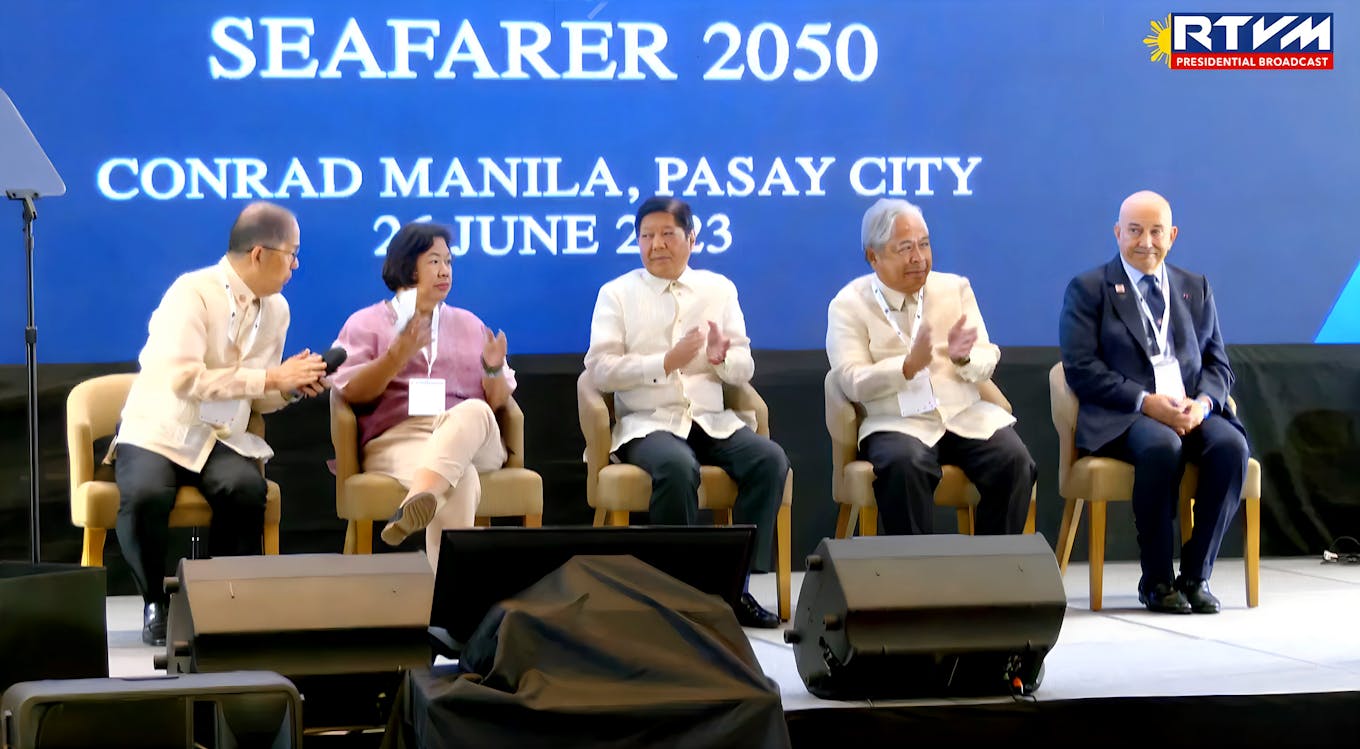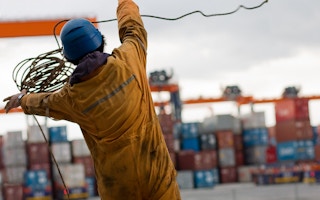The Philippines, the world’s top provider of seafarers and maritime officers, has declared its support for net-zero shipping emission reductions by 2050.
To continue reading, subscribe to Eco‑Business.
There's something for everyone. We offer a range of subscription plans.
- Access our stories and receive our Insights Weekly newsletter with the free EB Member plan.
- Unlock unlimited access to our content and archive with EB Circle.
- Publish your content with EB Premium.
“We support net-zero by 2050. We are committed to an equitable transition … the workforce is where it [the transition to cleaner shipping] will have the most impact for us,” the delegation said on Tuesday at the International Maritime Organisation’s (IMO) intersessional working group in London.
According to a source who attended the closed-door negotiations, the Philippine delegation also expressed agreement for an interim reduction target by 2030 but did not indicate the extent of planned emissions cuts.
The IMO, which is the United Nations body that regulates the safety and environmental performance of international shipping, reconvened this week for a 14-day debate on the adoption of a net-zero shipping emissions reduction target by 2050, ramping up its current climate plan that only aims to halve shipping emissions within the same time frame. The targets are set to be finalised at the Marine Environment Protection Committee (MEPC 80) by 7 July.
More than half a million Filipinos comprise a quarter of the global maritime workforce, followed by Russia, Indonesia, China and India.
What does ‘net-zero emissions’ mean?
Net-zero means cutting greenhouse gas emissions to as close to zero as possible, with any remaining emissions re-absorbed from the atmosphere, by oceans and forests.
What does ‘absolute zero-emissions’ mean?
Absolute net-zero refers to the decarbonisation of a business or sector using no offsets or balancing of residual emissions with carbon removal.
In preparation for the decarbonisation of the shipping industry, seafarers will need to be equipped with adequate skills and training to operate new technologies and handle alternative fuels like hydrogen and ammonia, which are being eyed for low carbon shipping due to their potential in reducing greenhouse gas emissions to near-zero.
However they are highly flammable and toxic, requiring more stringent safety levels than traditional fuels.
A stricter standard for shipping emissions will mean maritime companies will require training centres to ramp up adoption of guidelines for alternative fuels, said Max Mejia, president of Sweden-based World Maritime University.
“The Philippines is ready [to do the necessary upskilling of seafarers]. The movement to alternative fuels is inevitable, but it will require a global consensus for all shipping companies and training centres to comply,” Mejia told Eco-Business on the sidelines of a shipping conference held in Manila on Monday.
At the last climate summit in December, 32 countries voted in favour of an absolute zero-emission goal by 2050, including Asian nations such as South Korea and Japan, which are among the world’s biggest ship builders, while Singapore, the world’s biggest container shipping port, and Vietnam declared their support for a net-zero emission reduction by 2050. China, India, and Indonesia are opposing a higher ambition.
Global shipping carries around 90 per cent of trade around the world, emitting around one billion tonnes of greenhouse gases every year. Halving shipping’s emissions footprint would be equivalent to shutting down 121 coal power plants.
Support from the homefront

Philippine president Ferdinand Marcos, Jr (center) prepares to speak to the maritime sector at the “Shaping the Future of Shipping Seafarer 2050” summit on 26 June 2023. Image: Presidential Communications Office
Philippine president Ferdinand Marcos, Jr on Monday called on government education agencies to “ensure the upskilling and reskilling of Filipino seafarers to prepare them for the shift of ocean-going vessels from using conventional fuel sources to green ammonia between 2030 to 2040”.
“There is a need for the shipping industry to adapt and integrate new developments into their fleets, starting with the retooling of existing ships and the building of newer and more modern ships equipped with these new technologies,” Marcos, Jr said in his speech at a shipping conference held in Manila.
The European Maritime Safety Agency (EMSA) mulled a ban on Filipino seafarers in December, citing training deficiencies. Months later, the agency decided to continue to recognise Filipino seafarers in European ships after “constructive cooperation” with Philippine authorities in upgrading the maritime workers’ training programme and accreditation system. EMSA will be providing more than US$4 million to the government to help in the training of Filipino seafarers.
Want more Philippines ESG and sustainability news and views? Subscribe to our Eco-Business Philippines newsletter here.








